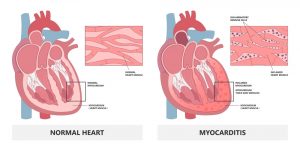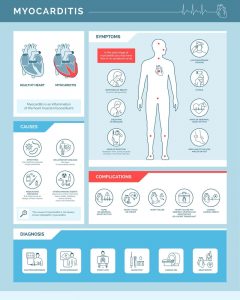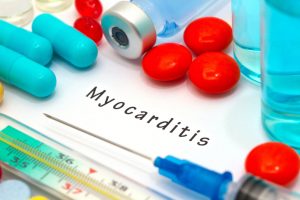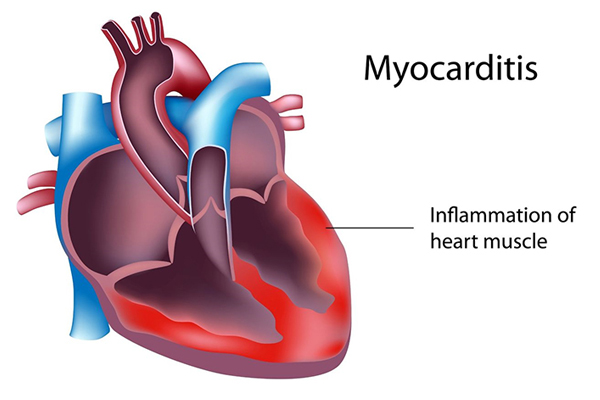Myocarditis: What are the Symptoms, Causes and Treatment?
What is Myocarditis?

It is an inflammation of the middle layer of the heart wall. This disease can damage the heart muscle and electrical system, which in turn reduces the heart’s ability to pump, leading to rapid or abnormal heart rhythms. Even though the precise cause of Myocarditis is unknown, it affects thousands of people in the U.S every year.
Myocarditis symptoms are generally experienced by otherwise healthy individuals. Approximately 5 to 20% of all cases of sudden deaths in young adults are caused because of Myocarditis.
What are its Causes?
Myocarditis can happen due to several reasons, such as viral infections, environmental toxins, autoimmune disease, and adverse reactions to medications. Although the diagnosis may vary its major long-term complication is chronic heart failure. In the United States, approximately 45% of heart transplants are as a result of Myocarditis and the related disorder of idiopathic dilated cardiomyopathy. Extreme Myocarditis makes the heart weak due to which the rest of the body does not get enough blood. A stroke or a heart attack can occur, given to clots that can form in your heart.
What are the Symptoms of Myocarditis?

In case you have mild myocarditis or it is on an early stage then you may not experience myocarditis symptoms. However, the most common myocarditis symptom is shortness of breath while doing exercise or exertion. You may experience this symptom after 7 to 14 days of viral illness, which may further lead to shortness of breath at night and may require you to sit up in order to breathe.
In Severe Cases, The Symptoms May Differ, Depending On The Cause Of The Disease. Other Symptoms of Myocarditis Include:
- Rapid or abnormal heart rhythms
- Chest pain
- Fatigue
- Fluid retention along with swelling of legs, feet and ankles
- Headache,
- Joint pain and body aches
- Fever
- Diarrhea
- Sore throat
In rare cases, myocarditis may cause a sudden loss of consciousness as a result of abnormal heart rhythm. An individual may experience all or some of the aforementioned symptoms.
How is Myocarditis Treated?

Treatment of this disease depends on the cause and severity of myocarditis. Usually, patients are advised to rest at the onset of the disease and are asked to avoid athletic activities for at least six months to avoid undue strain on the heart muscle. For chest pain and high fever, painkillers are advised. Earlier, the use of steroids has been tried to treat the disease; however, there are no clinical studies supporting that steroid is beneficial for myocarditis. Other cure for myocarditis includes:
- Giving antibiotics in case myocarditis is caused by a bacterial infection
- Treating heart failure or irregular heartbeats
- Putting pacemaker for irregular heart rhythms
- Steroid medication in case the cause is giant cell myocarditis.
- Staying away from alcohol if that is the cause
Prescription drugs are used in Myocarditis treatment:

Your doctor might prescribe medications to reduce your heart’s workload including:
- Angiotensin-converting enzyme (ACE) inhibitors. Enalapril (Vasotec), captopril (Capoten), lisinopril (Zestril, Prinivil), and ramipril (Altace), which are used to relax the blood vessels in your heart and help blood flow more easily.
- Angiotensin II receptor blockers (ARBs). Losartan (Cozaar) and valsartan (Diovan) help in relax the blood vessels in your heart and help blood flow more easily.
- Beta-blockers. Metoprolol (Lopressor, Toprol-XL), bisoprolol, and carvedilol (Coreg), These Beta-blockers, works in multiple ways to treat heart failure and help control arrhythmias.
- Diuretics. These medications used to relieve sodium and fluid retention, drugs are such as furosemide (Lasix),
The best cure for myocarditis is taking precautions such as getting vaccines on time, following good hygiene, avoiding people with a viral illness, and minimizing exposure to ticks.

